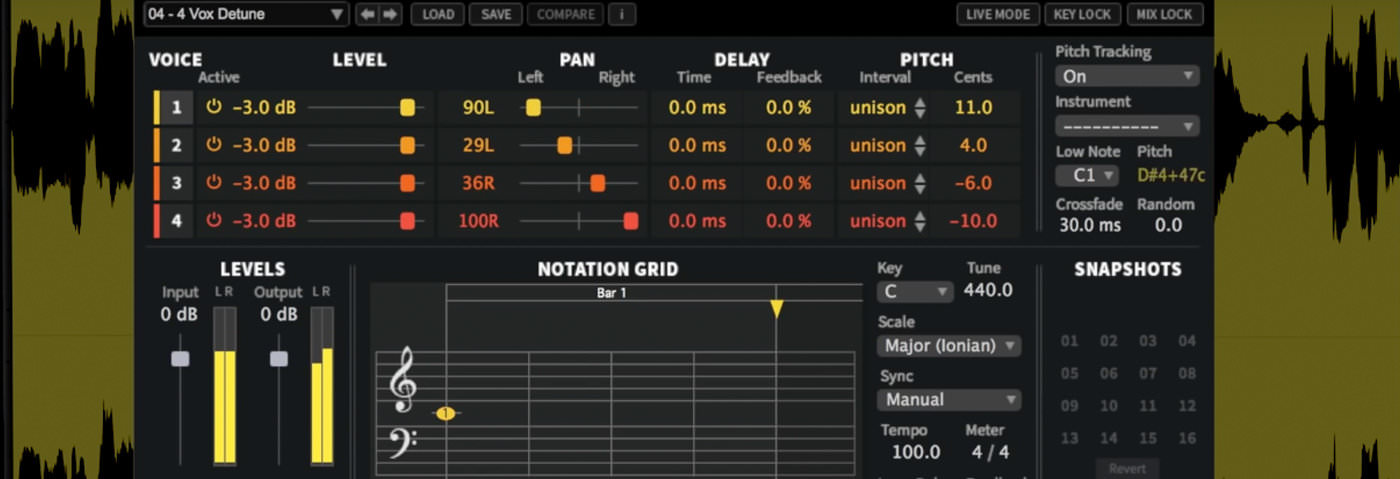Eventide’s new Quadravox plugin is the latest addition to the harmonic processor kings’ roster. Dave Clews puts it to the test.
New Jersey’s Eventide are pretty much the harmonic processing kings, having mostly cornered the market since the days of their famous hardware H910 and H949 boxes of the 1970s. Developed using technology from their flagship H8000FW studio processor, their new Quadravox
Harmonizer plugin therefore comes with an excellent pedigree, but also has some fairly big shoes to fill, so how does it stack up?
Available to buy on its own or as part of the Anthology X bundle of 17 plugins, Quadravox is a four-voice, diatonic pitch-shifting delay, available in AU, VST and AAX formats, that dishes up satisfying dollops of the famous Eventide sound directly to your DAW. The term ‘diatonic’ in this case refers to how each of the four voices can be shifted precisely to a pitch that belongs to the currently selected key and scale, just by setting the required intervals. So you can conform the pitches of the harmonies Quadravox generates directly to notes that occur within the key of your track.
The interface is clearly laid out and easy to navigate, with chunky white text on a black background and colour-coded controls for added clarity; the louder a voice is, the brighter its colour in the display, and the colour also changes from yellow through orange to red as you pan each voice left to right. As a result, it’s easy to tell each voice apart at a glance when all four are active.
All the main parameters for each of the four voices (on/off, level, pan, delay and pitch) are adjustable via a central clutch of horizontal sliders, drop-down menus and typed-value entry boxes. Alternatively, you can use the innovative notation display, in which the pitch intervals and delay times can be set by dragging each voice around as if it were a note on a musical stave. Pitch is adjusted by moving a voice’s tab vertically up and down the treble and bass clefs, while delay is controlled by moving left or right within the bar display. This is of great use if you’re after a particular set of harmonies and know your way around a musical score. Also found here is a final loop delay control, which allows you to add a second delay to the overall four-voice effect.
There are lots of thoughtful touches, such as a Live mode that dispenses with the 40ms latency that the plugin operates under by default, 32 automatable snapshots that can be saved and recalled with a click and the Mix Lock and Key Lock features. These allow you to flick through the presets whilst maintaining the same dry/wet balance and key and scale settings for each, although it’s worth noting that Mix Lock only fixes the dry/wet balance and not the input and output levels.
The 99 bundled presets offer a rounded selection of the Harmonizer skillset, from micro pitch shifters and vocal thickeners through to arpeggiated delays, stacked harmonies and crazy sci-fi multi-effects. It’s when flicking through these while strapped across nothing more than a simple piano sound that you begin to realise that Quadravox is a highly useful compositional tool with the ability to fundamentally alter the character of whatever you care to play through it. Pianos become scintillating 12-string guitars or shimmering arpeggios, staid drum tracks take on entirely new, complex and compelling rhythmic structures and synths just become something else altogether. Short delay times and small shifts in pitch can be used to thicken and widen sounds, while longer times and larger shifts can conjure up intricate, funky grooves, melodic arpeggiated delays, or any combination thereof. Maximum delay time per voice is 2.4 seconds, and the pitch shift range is two octaves up or down – more than enough for most applications.
In broad terms, Quadravox essentially performs two functions – as an emulation of a classic creative effect wrapped up with all the convenience of a modern plugin it’s outstanding, working brilliantly on monophonic synths, guitar, piano, drums and pretty much anything else. Conversely, it can be set up quickly and easily to create vocal harmonies tailored to a specific key and scale, although it’s missing any kind of formant adjustment for the four voices, meaning that your virtual backing singers can all too easily sound like chipmunks or scary robots. However, this is part of the unit’s retro charm – I love the fact that this harks back to Eventide’s pioneering hardware of the 70s, when digital signal processing was in its infancy and sounded as such. Formant correction aside, as a pitch-shifting multi-effect it definitely ticks all the boxes, actually going beyond to mark itself out as a positively inspirational compositional tool. You’d expect Quadravox to be good simply from the name on the box, and it certainly doesn’t disappoint.
The Verdict
Price: $99 (Introductory $49 until Oct 31 2016)
Purchase: Eventide Quadravox
The Final Word
You’d expect it to be good simply from the name on the box, and it certainly doesn’t disappoint.
